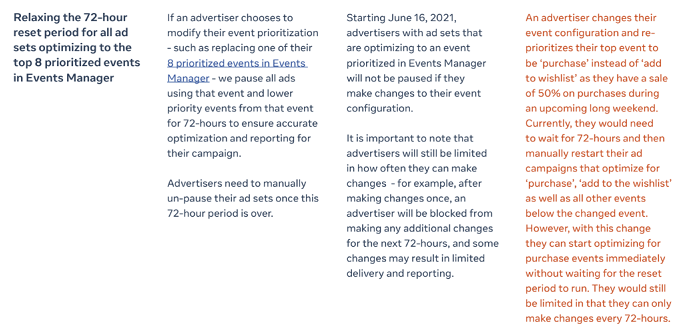SOCIAL
Facebook Rolls Out Updates to Conversion Modeling and Events in Responds to ATT Changes

As Facebook continues to get a better understanding of the full impacts of Apple’s new App Tracking Transparency update, which has seen many users cut off its in-app data tracking, limiting insights for Facebook advertisers as a result, The Social Network is also looking to make changes to its attribution modeling processes to help account for lost insights, and better guide advertiser decisions moving forward.
Last week, Facebook sent out a new update to selected advertisers relating to its latest changes in regards to how it’s now tracking events and conversions, in light of the reduced data flow which has impacted performance reporting.
Here’s what’s changed:
First off, Facebook will now allow advertisers to update their focus event for a campaign without the advertiser having to pause and manually restart it with every change.

That’ll make it easier to keep your campaigns moving, with more flexibility to change focus based on performance trends.
Facebook’s also adding estimated conversions into its 7-day click attribution window, which will help advertisers account for data lost due to the ATT update.

With the ATT changes, many Facebook advertisers have seen a significant reduction in conversions because Facebook is no longer able to track them, but this will provide a more accurate view of performance based on modeled estimates. Many advertisers are also reporting major mismatches between their data reporting tools, because they can’t connect the dots between Facebook reporting and their actual performance, and this will help to reduce those gaps.
And lastly, Facebook’s providing more flexibility for marketers looking to maximize performance to Android users, by expanding their event options in their campaign set-up.

That will mean that advertisers looking to target Android users will have more capacity to optimize their campaigns based on performance – though this won’t help those looking to reach users on iOS.
The changes here are fairly technical, but they’ll have big impacts for media buyers and performance marketers who are looking to maximize their Facebook ad spend. And while modeled data will never be as good as actual performance, by providing more insight that aligns with overall performance, Facebook’s hoping to help marketers see more accurate results tracking for their spend, which they can then better attribute in other elements.
